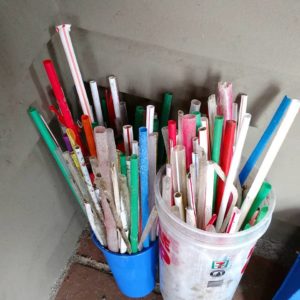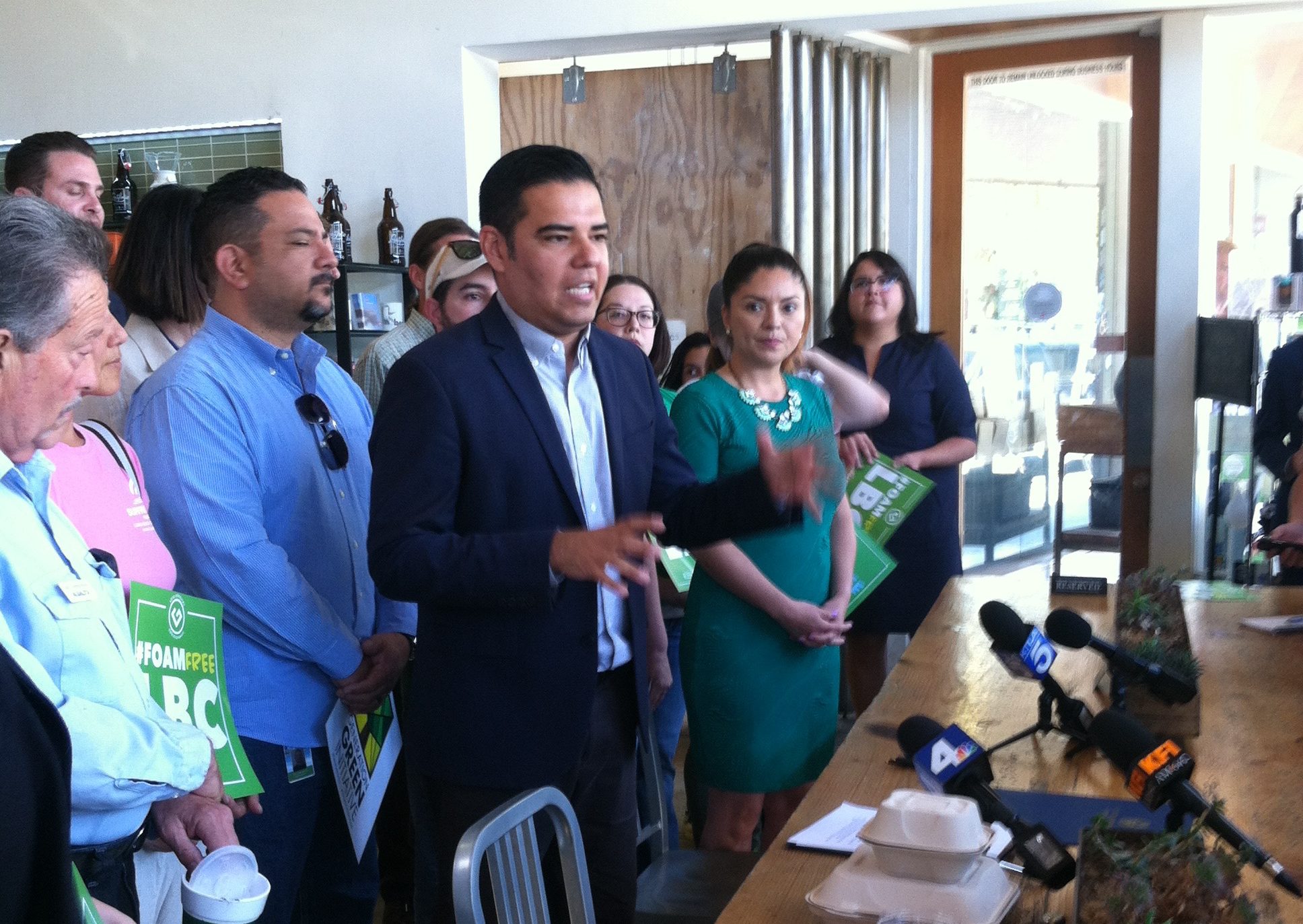Yes, Long Beach has banned some single-use plastic. But what about those exemptions for straws, utensils, and cup lids?
by Greggory Moore, Contributor | Published June 1, 2018 in Journalism
12 minute readOn May 4, Long Beach became the newest member of a growing club of cities that have banned restaurants and other food-service vendors from using certain polystyrene products.
“It’s incredibly important for us to lead on this issue,” Mayor Robert Garcia proclaimed minutes before signing the new law. “Long Beach has always led on issues of sustainability.”
Whether Garcia’s boast is accurate depends on how you define leadership.
While it’s fair to say Long Beach was ahead of the curve when it banned single-use plastic shopping bags in 2011, the California cities of Manhattan Beach, Malibu, Fairfax, and San Francisco all made the same move three to four years earlier. Then, for the next six years, Long Beach did not institute any sort of ban or restriction on any sort of plastic product.* And now that the City has taken action, the scope is curiously limited.
To be sure, Long Beach’s new ban, which chiefly concerns food and beverage containers made from expanded polystyrene (EPS), is a step forward. However, the city council consciously sidestepped the issue of single-use plastic waste generated by cup lids, utensils, and straws by explicitly exempting these items from the definition of “disposable food service ware.”



This curious conceptual gerrymandering informed my first question to Councilmember Lena Gonzalez, the ban’s author: By what logic are single-use plastic straws, etc., not disposable food service ware?
“It’s not so much [a question of] logic,” she said, “and they absolutely should be [banned]; but we have nine members of the city council, and not everybody was fully on board [with this ordinance]. If you’ve seen previous discussions, [you know] that there was talk of delaying this [new law] another year. So to get to this point was a huge success. However, during the 18 months before the ban is fully enacted [for all restaurants, etc.], we’ll have a chance to study this again, [… which] provides us with an opportunity to then say, ‘There are all these other cities that have [banned] straws. Why don’t we do that this time?’ […] We need to implement that at some point.”
Although Gonzalez says that the City’s Environmental Committee and the various environmental groups represented at the May 4 signing at Berlin Bistro were “absolutely” involved in crafting the ordinance, the organizations FORTHE Media surveyed—including the Sierra Club’s Long Beach Area Group, the Algalita Marine Research Foundation, the Long Beach Environmental Alliance (LBEA), and the Long Beach chapter of the Surfrider Foundation—report that they were consulted only late in the process and so the ordinance was crafted with little or no input from them. “No community groups helped to write the ordinance,” says the Sierra Club’s Gabrielle Weeks. “Our contribution to the language [of the ordinance] was minimal,” says Algalita’s Katie Allen.
Councilmember Daryl Supernaw, who chairs the Environmental Committee, speculates that this is partly why the scope of the ban is so narrow, noting that his committee had no hand in crafting the ordinance during its formative stages. “There was a lot of water under the bridge before we were asked for input,” he recalls. “By the time the ordinance was put forward for discussion, it just didn’t seem like [banning straws, etc.] was on the radar.”

Although most area environmental groups celebrate the EPS ban as progress, the narrowness of its scope makes for mixed feelings. “It’s frustrating, but at the same time I feel it’s a step in the right direction,” says LBEA’s Audrey Ridenour. Surfrider’s Seamus Innes echoes those sentiments: “We would rather [the ordinance] not have exemptions, but we got what we got. It certainly wasn’t worth holding up for its imperfections.”
When asked why it was seven years between plastic-related bans, Garcia would only say that “it’s a complicated process. […] Sometimes things take longer than we would like, and we know now that we take the next step.”
For his part, Vice Mayor Rex Richardson is content with the pace of change in Long Beach, and he is also happy with the scope of the new ordinance. “What we’re trying to do is shift the behavior of shops, businesses, the people who consume things,” he said. “If there’s been a common theme [in crafting the ordinance], it’s a lot of discussion of phasing things in, [… and] a lot of that comes from feedback with the public.”
Tomisin Oluwole
Face the Music, 2022
Acrylic on canvas
24 x 36 inches
Click here to check out our interview with Tomisin Oluwole, a literary and visual artist based in Long Beach.

Instead of gunking up our site with ads, we use this space to display and promote the work of local artists.
And while Richardson recognizes single-use plastics as an issue worthy of future city council attention, he takes a wait-and-see approach concerning whether they will press forward with banning such items in the foreseeable future. “After the initial stage [of implementation], we can come back and reevaluate the ordinance—expand it or limit it. We built that into the process.”
While defending the process, at times Garcia at least sounds unequivocal on the need to expand the ban sooner rather than later, saying that starting with a limited scope “is to ensure that there’s a transition period for businesses, and that this is not a complete burden for them overnight. [But] we know, for example, that plastic straws are a huge problem, and there’s restaurants like Berlin that have voluntarily switched their product. Part of this process is, as we’re removing [EPS], to educate businesses and to get us to a point where [banning other single-use plastic products] is the next step. And we’re going to get there. […] It should not be a discussion. We are causing irrevocable damage to marine life [and] to our coastal waters.”
Gonzalez intimates that the ban might have been broader had there been less resistance from some of her fellow councilmembers, though she does not name names.** She also notes that there was some pushback from the business community.
Does she think Long Beach is lagging behind several other West Coast cities—for example, Manhattan Beach, which in April banned the very items specifically exempted by the new Long Beach ordinance—in terms of environmental friendliness?
“Absolutely,” she says. “Seattle, San Francisco, definitely Malibu…Santa Monica is always a great leader on the environment. And I think we can get there. I didn’t even know [the EPS ban] could happen. Now for the next six months we’re going to be talking to people, educating people, and I think more of the business community will see the value in it and lean in the direction we’d like them to. […] We need to push forward and make sure that we become environmentally friendly in all different facets.”
For now, it’s business as usual when it comes to utensils, cup lids, and straws. Will it be a year before Long Beach follows the lead of the West Coast cities at the vanguard of environmental-friendliness? Two? Another seven? Californians will have to wait and see.
In the meantime, the words Garcia said about EPS just after signing the ban can just as easily be applied to the plastic products it exempts: “With Long Beach being the last city on the L.A. River, it’s incredibly important for us to lead on this issue. And if we’re not going to ban this incredibly harmful form of plastic, then how can we expect the state and others to do the same?”
NOTES:
* By way of comparison, consider the City’s history with medical marijuana. Between 2010 and 2016, Long Beach passed 1) an ordinance legalizing medical marijuana dispensaries, 2) organized an elaborate lottery system to allocate the permits for such, 3) created and executed the various licensing and inspection processes before allowing roughly two dozen dispensaries to open, 4) passed a total ban on dispensaries and went through the necessary steps to close them, 5) fielded dozens of pertinent lawsuits, 6) formed a medpot task force to study the possibility of once again sanctioning dispensaries, 7) put two medpot ballot measures up for public vote, and 8) passed another ordinance allowing for dispensaries. In other words, it does not seem beyond the realm of possibility that in the six years between the bag ban and today the city council could have taken further action to reduce plastic waste if its members had the collective political will to do so.
** Councilmembers Dee Andrews, Al Austin, Jeannine Pearce, Suzie Price, Stacy Mungo, and Roberto Uranga were informed of the topic of this article and supplied with pertinent questions (including why single-use plastic straws, cup lids, and utensils were exempted from the definition of “disposable food service ware” and whether such items should be banned), but all chose not to comment.

Greggory Moore is a contributor to FORTHE media. This is his inaugural piece.
“I live in a historical landmark in downtown Long Beach. I spend a lot of time in coffeehouses. I love to dance. And as Hamlet says: words, words, words.”
Help Us Create An Independent Media Platform for Long Beach
We believe that what we are trying to do here is not only unique, but constitutes a valuable community resource. We are dedicated to building a fiercely independent, not-for-profit, and non-hierarchical media organization that serves Long Beach. Our hope is that such a publication will increase civic participation, offer a platform to marginalized voices, provide in-depth coverage of our vibrant art scene, and expose injustices and corruption through impactful investigations. Mainly, we plan to continue to tell the truth, and have fun doing it. We know all this sounds ambitious, but we’re on our way there and making progress every day.
Here’s what we don’t believe in: our dominant local media being owned by one of the city’s wealthiest moguls or a far-flung hedge fund. We believe journalism must be skeptical and provide oversight. To do so, a publication should remain free from financial conflicts of interest. That means no sugar daddy or mama for us, but also no advertisements. We answer to no one except to our readers.
We call ourselves grassroots media not only because we are committed to producing work that is responsive to you, dear reader, but because in order for this project to continue we will also need your support. If you believe in our mission, please consider becoming a monthly donor—even a small amount helps!


 greggory.moore@gmail.com
greggory.moore@gmail.com




